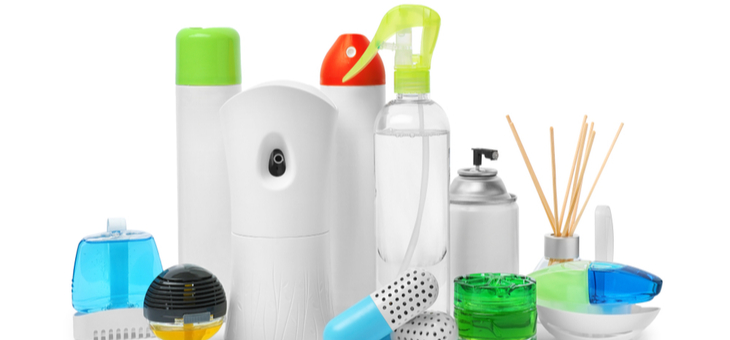Do scents and fragrances make you feel unwell? If they do, you’re not alone, says Professor Anne Steinemann, from the University of Melbourne, who calls the “fragrance problem” an epidemic. Her surveys have found that one in three people experience fragrance sensitivity. She believes some of the chemicals in perfumes, cleaning products and air fresheners make us sick.
“Some people have immediate, severe and disabling health effects. But the effects can be very subtle and insidious, and people may not realise they’re being affected until it’s too late.”
She says fragrance products emit a range of hazardous air pollutants including formaldehyde (a known human carcinogen) and acetaldehyde, and it doesn’t matter whether they are labelled ‘natural’, ‘green’, or ‘organic’.
No law requires disclosure of all its chemical ingredients and most fragrance products are mixtures of hundreds of synthetic chemicals.
“We have very little information on the toxicity of these mixtures – there’s a focus on individual chemicals. Also, very little information on the toxicity of a natural versus synthetic version of a chemical.”
There are usually a minimum of 14 secret ingredients in a perfume, but manufacturers often only put the label ‘fragrance’ or ‘parfum’ on their products. While they understandably seek to protect trade secrets, a full list of all elements would be indecipherable to most consumers. Most have not been scientifically tested to ascertain their safety.
The International Fragrance Association (IFRA) lists 26 fragrance allergens, but there are nearly 4000 available fragrance ingredients on their ‘transparency list’.
Healthline says a study conducted by the Environmental Working Group estimated that only 34 per cent of stock ingredients often found in fragrances were tested for toxicity.
Read more: Too much light damages us
Dr Ian Musgrave, molecular pharmacologist and toxicologist at the University of Adelaide, says Prof Steinemann’s claims are plausible but need more testing.
“Unless you are susceptible to migraine or asthma, the concentration of these chemicals in fragrances is well below any potentially toxic effect,” Dr Musgrave told domain.com.au.
“It would be better to ensure a good flow of fresh air rather than using fragranced products or, if not allergic to flowers, less concentrated sources such as potpourri or flowers.”
Prof. Steinemann agrees with keeping things simple.
“Instead of using these strongly scented chemical cleaning supplies, simply use bicarb and vinegar or even just plain water.
“It’s simpler, it’s effective, it’s less expensive and it doesn’t have the health risk – so things our grandparents or great-grandparents used. People think that to be clean they need to buy these multicoloured, fragranced cleaners, but they don’t. The very simple things are the best.”
The list of symptoms related to fragrant sensitivity is long. There are respiratory problems such as difficulty breathing, coughing, and shortness of breath; mucosal symptoms (e.g. watery or red eyes, nasal congestion, sneezing), migraine headaches, skin problems (e.g. rashes, hives, red skin, tingling skin, dermatitis), and asthma attacks.
And Dr Steinemann found that 9 per cent of people found the effects of fragrance disabling, costing them workdays or even jobs.
Perfumes may include:
- respiratory sensitisers that trigger wheezing or asthma
- hormone sensitisers that throw your endocrine system off balance
- secret ingredients that are harmful to your reproductive system when they build up in your body over time.
Read more: Minimise allergens in your home
Sustainability site earth911.com says the best way to safeguard yourself and your family is to use products that are known to use only natural ingredients.”
They offer a simple laundry powder recipe:
- 2 cups baking soda
- 2 cups washing soda
- 1.5 cups grated Castile soap
- 30 drops of lavender, lemon, or grapefruit essential oil (optional).
Healthline says if you experience the following symptoms in reaction to a fragrance, you should go to hospital:
- a spiking temperature
- boils or large hives
- drowsiness or a dip in energy
- confusion
- dizziness
- nausea or vomiting
- slurred speech
- elevated heart rate.
“If you’ve noticed redness, itching, or sinus irritation when you’re exposed to a certain fragrance, you probably have a sensitivity to something in it.”
Despite most perfume ingredients not being listed, you can keep an eye out for the following on labels:
- phthalates
- styrene
- galaxolide ketone and other musk ketones
- ethylene glycol
- acetaldehyde
- oxybenzone.
Scented hand sanitisers were recently recalled in the United States after it was revealed they contained methanol, a toxic chemical that can be absorbed through the skin.
Have you ever had a bad reaction to a scent? Would you use a homemade cleaning product?
Read more: Things in your home that can make you sick
If you enjoy our content, don’t keep it to yourself. Share our free eNews with your friends and encourage them to sign up.

